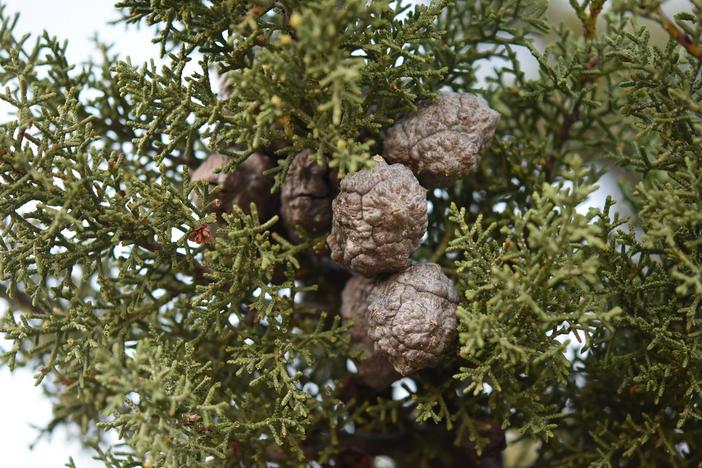Cuyamaca Cypress
(Hesperocyparis stephensonii)
Cuyamaca Cypress (Hesperocyparis stephensonii)
/
/

JOE BLOWE
CC BY-SA 2.0
Image By:
JOE BLOWE
Recorded By:
Copyright:
CC BY-SA 2.0
Copyright Notice:
Photo by: JOE BLOWE | License Type: CC BY-SA 2.0 | License URL: https://creativecommons.org/licenses/by-sa/2.0/ | Uploader: theforestprimeval | Publisher: Flickr







Estimated Native Range
Summary
Hesperocyparis stephensonii, commonly known as Cuyamaca Cypress, is an evergreen tree native to the chaparral and mixed evergreen forests of Southern California, particularly in San Diego County. It is adapted to dry, rocky slopes and ridges at elevations of 900 to 1500 meters, where it plays a role in the local ecology as a fire-adapted species. Mature trees may attain heights of 10 to 16 meters (33 to 52 feet) with a spreading habit and a central leader, often appearing slightly taller than wide. The foliage is dense with scale-like leaves, and the bark is fibrous and reddish-brown. It produces small, inconspicuous cones.
The Cuyamaca Cypress is critically endangered, with the native population severely reduced by wildfires. It is valued in cultivation for its drought tolerance and suitability for xeriscaping, as well as its rarity and conservation status. It is used in native plant gardens, natural landscaping, and habitat restoration projects. This species requires full sun, low water once established, and well-drained soils. It is not commonly available in the nursery trade, but efforts are ongoing to propagate it for conservation purposes. Gardeners should be aware of its endangered status and the importance of sourcing plants responsibly.CC BY-SA 4.0
The Cuyamaca Cypress is critically endangered, with the native population severely reduced by wildfires. It is valued in cultivation for its drought tolerance and suitability for xeriscaping, as well as its rarity and conservation status. It is used in native plant gardens, natural landscaping, and habitat restoration projects. This species requires full sun, low water once established, and well-drained soils. It is not commonly available in the nursery trade, but efforts are ongoing to propagate it for conservation purposes. Gardeners should be aware of its endangered status and the importance of sourcing plants responsibly.CC BY-SA 4.0
Plant Description
- Plant Type: Tree
- Height: 40-50 feet
- Width: 20-25 feet
- Growth Rate: Moderate
- Flower Color: N/A
- Flowering Season: Non-Flowering
- Leaf Retention: Evergreen
Growth Requirements
- Sun: Full Sun
- Water: Low
- Drainage: Medium
Common Uses
Bird Garden, Drought Tolerant, Fragrant, Low Maintenance
Natural Habitat
Native to dry, rocky slopes and ridges in chaparral and mixed evergreen forests of Southern California
Other Names
Common Names:
Scientific Names: , Hesperocyparis stephensonii, Cupressus stephensonii, Cupressus revealiana, Cupressus arizonica var. stephensonii, Cupressus arizonica subsp. stephensonii, Hesperocyparis revealiana, Cupressus arizonica subsp. revealiana, Cupressus arizonica var. revealiana, Callitropsis stephensonii,
GBIF Accepted Name: Cupressus arizonica var. stephensonii (C.B.Wolf) Little